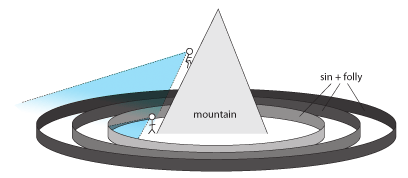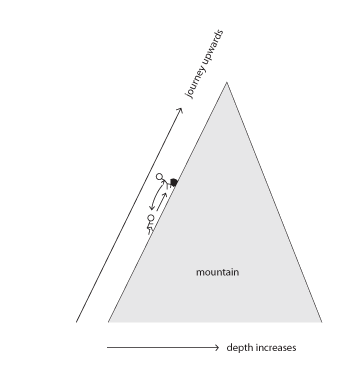Was listening to Matt Chandler again (I think it was 'The Good Fear', a sermon in the Hebrews series) and he made quite an interesting, almost throwaway comment on sanctification. It's on these lines:
It's written into the universe that when something stops growing it begins to die.
How unbelievably true. When we stop growing, stop learning, stop discovering on our walk with Christ we totally lose our momentum. Our faith begins to dry up, shrivel up. Like a great tree beginning to die, it can have all the outward appearance of strength but none of the inward life. It's only a matter of time before it reveals it's true form.
"...you have become dull of hearing. For though by this time you ought to be teachers, you need someone to teach you again the basic principles of the oracles of God."
Hebrews 5:11-12
Oh for a kick up the backside! How easy it is to become dull over the years and suffer a slow, subtle death. God's given us a big bible, there's a lot to discover. Best not think we know it all!
Saturday, 20 November 2010
Don't Die
Fear
Last thursday at Life Group we watched the Francis Chan 'Basic Series' on the fear of the Lord. The week leading up to it I was chewing it all over, and it's been really good. I've done a few talks on the fear of the Lord before but this DVD has thrown some extra verses into the mix and shed further light. As it happens, the fear of God plays out in some quite unexpected ways.
One of the things that really strikes you from the DVD is how fearful of God we should really be. My gut reaction is this: I have a certain level of fear, but nowhere near enough.
"When I saw him, I fell at his feet as though dead"
Revelation 1:17a
Francis Chan relates to all these biblical characters that had an encounter with God and were absolutely terrified. Even when people see Angels in the bible they're nearly scared to death. All of this leaves certain questions spinning round your mind:
Should I have that terrifying level of fear?
Is it even possible?
Is it even appropriate for daily life?
Does it not conflict with all the hope and promise we have in Jesus Christ, that we are in fact reconciled to God, and can boldly approach his throne? (Hebrews 4:16)
On the one hand you would have to conclude that the appropriate level of fear would probably kill you. Like in Exodus 33:18-23, Moses isn't allowed to see God's face, only his back, because no one could survive that. Part of my speculation on the hiddenness of God is that it's not his plan to terrify us on a daily basis.
But on the other hand a certain level of fear is prescribed. Without it, you wouldn't even be a Christian.
"The fear of the LORD is the beginning of knowledge, but fools despise wisdom and discipline."
Proverbs 1:7
"The fear of the LORD is the beginning of wisdom; all who follow his precepts have good understanding. To him belongs eternal praise."
Psalm 111:10
Some musings
These two verses highlight some really interesting points. Firstly, why is the fear of God the beginning of knowledge and wisdom? It must lay the foundation for everything else. If we don't understand that the universe and humanity was designed and created by an awesome God, all of our knowledge runs astray.
You can be really, really intelligent in the same way that you can run really fast in completely the wrong direction. All these scientific, social, biological, philosophical theories are constructed, but they miss vital ingredients and it changes everything.
Secondly, in the first verse, why does it say 'fools despise wisdom and discipline'? Surely it should say 'fools despise the LORD'. I would guess that wisdom and discipline both imply a change of lifestyle. It feels restrictive. Fools hate the idea.
But this has some personal implications. To what degrees, as Christians, are we fools? What areas do we despise wisdom and hate discipline? We've all got areas where we accommodate all sorts of sin and disobedience, lack of discipline, lack of fear. It's so easy to read about 'fools' in the bible and not think you're one of them.
Fear of God equals faith
"Do not be afraid of those who kill the body but cannot kill the soul. Rather, be afraid of the One who can destroy both soul and body in hell. Are not two sparrows sold for a penny? Yet not one of them will fall to the ground apart from the will of your Father. And even the very hairs of your head are all numbered. So don't be afraid; you are worth more than many sparrows."
Matthew 10:28-31
This concept of fear is not just an Old Testament, Old Covenant thing. Here Jesus himself, in the New Testament, tells us to fear. But the theme develops.
He says “be afraid” and then “don’t be afraid”.
We have one type of fear that conquers all others.
And this seems to rather aptly answer the question 'what level of fear is appropriate?'. Our fear of God should quench all others. When we're on the same team as God, when eternity is secured, even death is now an upgrade. In the verse above, the threat of murder is completely annulled. Fear of God equals faith in God.
The fear of the LORD is the weight behind us
"What, then, shall we say in response to this?
If God is for us, who can be against us?"
Romans 8:31
It’s not just Christians who should fear God. It’s everyone. If we could really grasp how terrifyingly awesome our God is, we might understand the depth of our confidence in Him.
And finally...
The fear of the LORD equals life
"The fear of the LORD leads to life: then one rests content, untouched by trouble."
Proverbs 19:23
That sounds unbelievably good. Life, rest, contentment, peace – untouched by trouble even if surrounded by it.
Sunday, 19 July 2009
Sin after salvation

The gospel is very good news because it tells us that everything's been put on Jesus. Every one of our sins – past, present and future – has been laid on him. The Christian stands before God with the righteousness and purity of Christ. There's not a spot of guilt or shame, but absolute holiness. And that's our position before God at this very minute.
But we still sin though right? Romans 7 confirms this. And we're still totally righteous before God in-spite of this. Romans 8:1 (the very next verse) confirms this.
But lets be honest... sin still has an effect on us.
I've been churning this over in my mind for the last couple of years, about the nature of sin. And I've started to think that maybe the Christian life is like climbing a mountain. When you enter into relationship with God it's like you're at the bottom; you've placed one foot on the beginning of the path.
At this point, you can see the immediate and most obvious sin that surrounds your life. As you mature and travel further up the path, your perspective changes. You're perspective becomes increasing closer to God's perspective. Interestingly, I've heard wisdom described as "thinking God's thoughts after Him".
As you look back over your life, more and more of your sin comes into view. Old things that you never previously considered now look ugly. Here, in this new position, the nature of sin is different. Instead of drowning in sin, it's now takes the form of a stumbling block.
The stumbling block can cause you to slip and lose ground already trodden. It can slow your momentum or completely halt your progress. Could it be that certain repeated sins completely halt the depth of your relationship with God? You're still in the same place (justified and on the path), but the ground beneath your feet ceases to increase.

